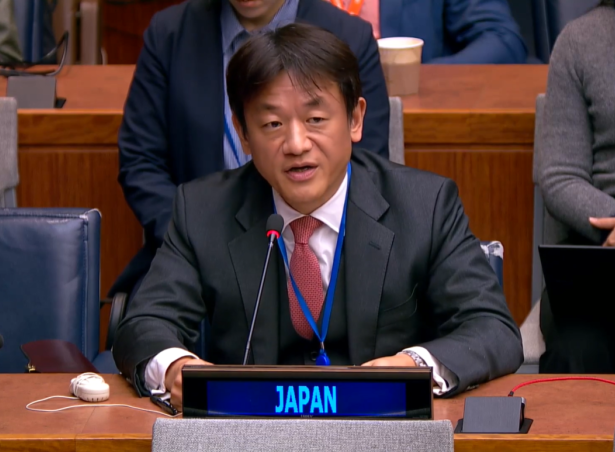Statement by Mr. IRIYA Takayuki, Minister, Permanent Mission of Japan to the United Nations, at the General Debate of the Fourth Committee, 80th Session of the UN General Assembly On Agenda Item 51: Comprehensive review of the whole question of peacekeeping operations in all their aspects
2025/11/11

Thank you, Mr. Chair.
At the outset, I would like to take this opportunity to express our gratitude to all peacekeepers who risk their lives serving in peacekeeping missions, and to extend our condolences to the families of those who have made the ultimate sacrifice. Their courage and dedication remain at the core of our peacekeeping efforts.
Mr. Chair,
In recent years, under increasing financial constraints, UN peacekeeping operations have been called upon to deliver clearer and more tangible results in a shorter time. The general idea of being cost-effective suggests the need to achieve meaningful outcomes with limited resources – an expectation that applies equally to UN peacekeeping.
While it is important to keep in mind the culture of efficiency, let me also remind us that the UN operates on shared principles and collective consent, as enshrined in its Charter.
For peacekeeping missions mandated to support political solutions, dialogue remains the most essential means to achieve progress. Dialogue, however, rests on trust – trust between the mission and the host government, as well as with the local population.
Such trust cannot be built overnight; it must be nurtured patiently through mutual understanding and respect over time. Because this process of confidence-building takes time, when a mission is mandated to support the implementation of a peace agreement, it is vital to recognize that its engagement may need to span many years, even decades.
With this in mind, Japan places particular emphasis on three key priorities to ensure the sustainability of peacekeeping operations.
First, partnership. Building relationships rooted in the local context provides legitimacy and continuity to peacekeeping efforts. Collaboration with host nations and regional organizations enhances the credibility of PKOs and strengthens their foundations.
Second, the safety and security of peacekeepers. Peacekeeping cannot continue without the invaluable contributions of Member States, and we must ensure that the personnel they provide can safely carry out their duties. Addressing emerging threats – such as improvised explosive devices, drones, artificial intelligence, misinformation, and hate speech — is therefore essential.
Japan contributes to these efforts, including through its support for training in counter-IED, peacekeeping intelligence, and situational awareness under the UN Triangular Partnership Programme led by the Department of Operational Support, as well as the A4P Monitoring Project, which helps missions strengthen trust with local communities.
Third, advancing discussions on peace transitions. To make peacekeeping truly sustainable, it is essential to ensure a smooth transition from peacekeeping to peacebuilding, so that the progress achieved by missions can take root and endure. Japan believes a comprehensive approach is necessary to address the multifaced root causes of conflict. Therefore, as Vice-Chair of this year’s Peacebuilding Commission, Japan considers it is important that relevant UN system agencies strengthen coordination and reinforce the nexus between peacekeeping, peacebuilding, and development as missions pursue the transition from peacekeeping to peacebuilding.
Through these efforts, Japan remains firmly committed to working closely with Member States and the UN Secretariat to help make peacekeeping more effective, sustainable, and truly responsive to the needs of the people it serves.
I thank you, Mr. Chair.
